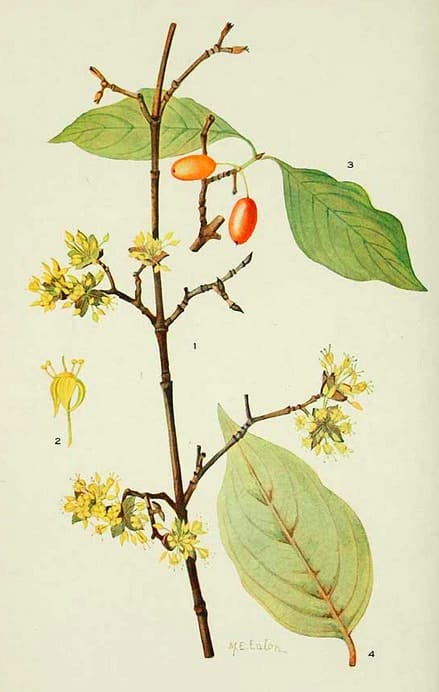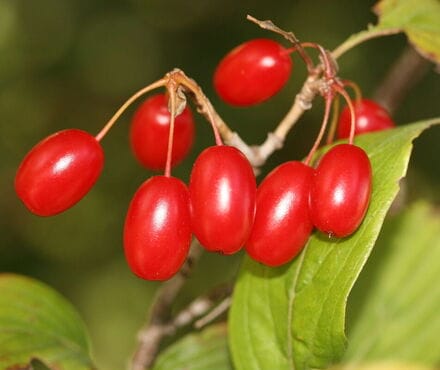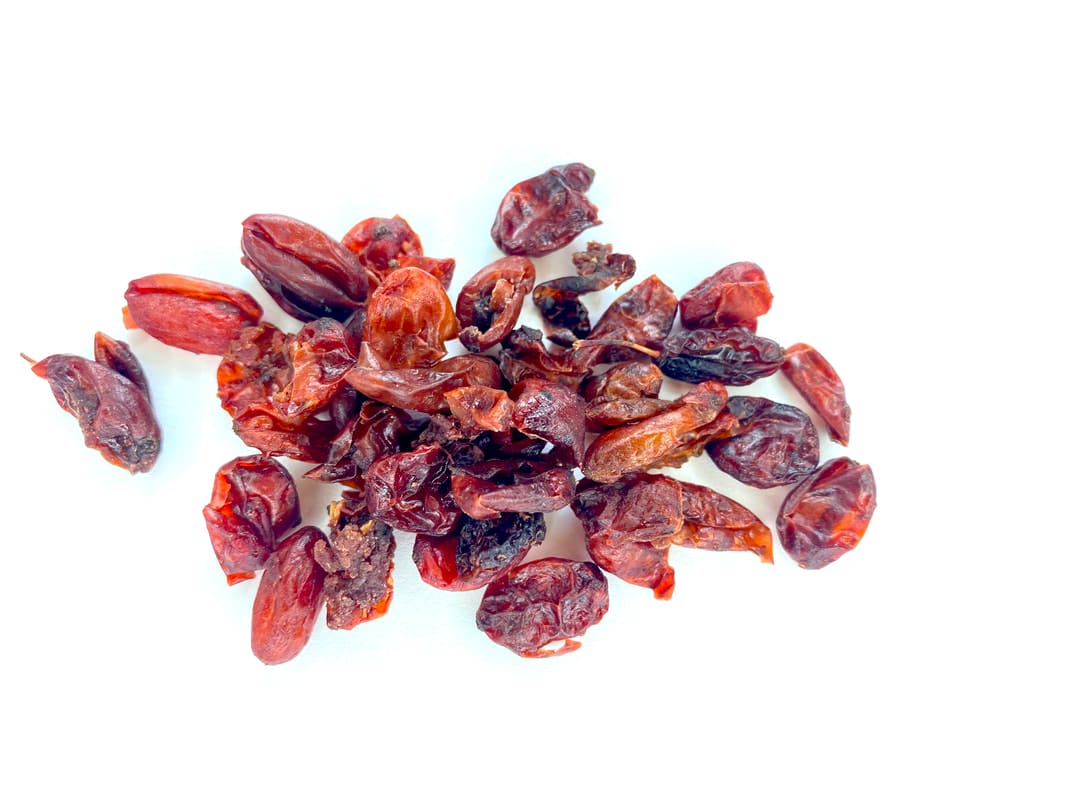Cornus, Shan Zhu Yu 山茱萸
Asciatica Cornelian Cherry
Shan Zhu Yu (TCM)
Addisonia , 1918
Cornus officinalis
(Photo by
Alpsdake ) (
Wikimedia )
Cornus
Shan Zhu Yu fruit
(Adam, 2017)
Botanical name: Cornus officinalis
The fruit of the Western Cornelian Cherry, C. mas, has been used similarly. It was listed as a astringent by
Dioscorides for Diarrhea and Dysentery. In addition, the Flora of China states that C. mas is grown medicinally in China.
Parts used: Fruit
Temperature & Taste: Slightly Warm, dry. Sour
Classifications: 2O. ASTRINGENTS TCM:
R. Astringents
Uses: 1. Stabilises the Kidneys, Astringes the Essence:
-Frequent Urination, Incontinence
-Spermatorrhea, Premature Ejaculation, Leukorrhea
-Lower Back pain from Kidney weakness
-excess Sweating from Kidney or Yin deficiency
-‘
arthralgia due to invading pathogenic Cold and Humidity’ (Shen Nong Ben Cao ) 2. Astringes to Stop Sweating:
-excess Sweating from Qi or Yang deficiency
3. Tonifies Liver and Kidneys:
-secures Liver Yin to stop formation of Internal (Liver) Wind
-light-headedness, dizziness, blurred vision, tinnitus
-weakness of the Lower Back and Knees
-Impotence
-tonifies Yang, supports the Yin and astringes the Essence.
-‘
reinforces Kidney qi, enhancing male sexuality, hardens the ejaculation and fills in the marrow and essence’. (Zhen Quan ) -‘
Long-term use brightens the eye, reinforces physical strength and enables one to enjoy a long life.’ (Ming Yi Bie Lu ) 4. Stabilises Menstruation, Stops Bleeding:
-prolonged or excessive Menstruation from deficiency
Dose: Decoction: 6–12 grams
Powder: 1 ½–4 grams
Substitutes: Prunus pseudocerasus and Barberry spp. fruit were apparently classical sources of
Shan Zhu Yu (
see here )
Main Combinations: Three Kidney Medicines Shan Zhu Yu is often combined with Dioscorea
Shan Yao and Rehmannia
Shu Di Huang . This trio forms the basis of the most important formulas used to strengthen the Kidneys. Alone, they nourish Kidney
Yin and are usually corrected with the addition of Poria
Fu Ling , Alisma
Ze Xie and Paeonia
Mu Dan Pi (as in
Liu Wei Di Huang Wan , ‘Rehmannia ‘). When combined with Cinnamon (
Rou Gui ) and Aconitum
Fu Zi , it is called
Shen Qi Wan (Kidney Qi Pill) and is used for
Yang deficiency.
1. Kidney
Yin and
Yang deficiency, with Spermatorrhea, Palpitations, shortness of Breath,
Cornus Shan Zhu Yu with Schisandra
Wu Wei Zi .
2. Impotence, Urinary frequency,
Cornus Shan Zhu Yu with Eucommia
Du Zhong and Cuscuta
Tu Si Zi .
3. Excessive sweating from Qi or Yang deficiency
Cornus Shan Zhu Yu with Codonopsis
Dang Shen and Astragalus
Huang Qi .
4. Spontaneous Sweating, Night Sweats,
Cornus Shan Zhu Yu with Zizyphus
Suan Zao Ren , Schisandra
Wu Wei Zi , Astragalus
Huang Qi 5. Nightsweats from Yin deficiency:
i.
Cornus Shan Zhu Yu with
Dang Gui and Rehmannia
Shu Di Huang .
ii.
Cornus Shan Zhu Yu with Fossil Bones (
Long Gu ), Oyster Shell (
Mu Li )
6. Hypertension from Liver and Kidney deficiency,
Cornus Shan Zhu Yu with Eucommia
Du Zhong and Mistletoe (
Sang Ji Sheng )
7. Heavy or prolonged Menstruation from Heat and deficiency, with dark, thick blood,
Cornus Shan Zhu Yu with Paeonia
Bai Shao and Ass Hide Gelatin (
E Jiao ).
8. Profuse pale, thin menstrual bleeding,
Cornus Shan Zhu Yu with Cuttlebone and Madder
9. Spermatorrhea, weakness and pain of the Lower Back,
Cornus Shan Zhu Yu with Cistanche
Rou Cong Rong , Cuscuta
Tu Si Zi and Schisandra
Wu Wei Zi .
Major Formulas: Liu Wei Di Huang Wan Er Long Zuo Ci Wan Ma Wei Di Huang Wan Ming Mu Di Huang Wan Qi Ju Di Huang Wan Zhi Bai Di Huang Wan Shen Qi Wan, Jin Gui Shen Qi Wan You Gui Wan You Gui Yin Zuo Gui Yin
Cautions: 1. Not used in Damp-heat urinary conditions
2. Cornus
Shan Zhu Yu is considered incompatible with Ligusticum
Chuan Xiong and Asarum
Xi Xin .
Main Preparations used:
GENERAL / REVIEWActive Components and Pharmacological Effects of Cornus officinalis : Literature Review. Cornus mas and Cornus Officinalis -Analogies and Differences of Two Medicinal Plants Traditionally Used. Corni Fructus: a review of chemical constituents and pharmacological activities. Ethnopharmacology, phytochemistry, and pharmacology of Cornus officinalis Sieb. et Zucc. [Herbological study on the botanical origin of the Chinese crude drug shan-zhu-yu]. [Comparative study on contents of amino acid and major and trace elements in Cornus officinalis before and after being processed]. [A survey of Cornus officinalis varieties]. Four New Gallate Derivatives from Wine-Processed Corni Fructus and Their Anti-Inflammatory Activities. Four new phenolic compounds from the fruit of Cornus officinalis (Cornaceae) and their anti-inflammatory activity in RAW 264.7 cells. Cornus officinalis Ethanolic Extract with Potential Anti-Allergic, Anti-Inflammatory, and Antioxidant Activities. Preparation and Evaluation of Antioxidant Activities of Bioactive Peptides Obtained from Cornus officinalis . Cornus mas and Cornus officinalis -A Comparison of Antioxidant and Immunomodulatory Activities of Standardized Fruit Extracts in Human Neutrophils and Caco-2 Models. Iridoids, Flavonoids, and Antioxidant Capacity of Cornus mas , C. officinalis, and C. mas × C. officinalis Fruits. Cornus mas and Cornus officinalis -A Comparison of Antioxidant and Immunomodulatory Activities of Standardized Fruit Extracts in Human Neutrophils and Caco-2 Models. Anti-Obesity Effects of Combined Cornus officinalis and Ribes fasciculatum Extract in High-Fat Diet-Induced Obese Male Mice. Loganin inhibits macrophage M1 polarization and modulates sirt1/NF-κB signaling pathway to attenuate ulcerative colitis. Loganin attenuates intestinal injury in severely burned rats by regulating the toll-like receptor 4/NF-κB signaling pathway. Microglial M2 Polarization Mediated the Neuroprotective Effect of Morroniside in Transient MCAO-Induced Mice. The neuroprotective role of morroniside against spinal cord injury in female rats. Neuroprotective Effects of Cornus officinalis on Stress-Induced Hippocampal Deficits in Rats and H2O2-Induced Neurotoxicity in SH-SY5Y Neuroblastoma Cells. Cornel iridoid glycoside exerts a neuroprotective effect on neuroinflammation in rats with brain injury by inhibiting NF-κB and STAT3. New Iridoid Derivatives from the Fruits of Cornus officinalis and Their Neuroprotective Activities. Neuroprotective iridoid glycosides from Cornus officinalis fruits against glutamate-induced toxicity in HT22 hippocampal cells. Neuroprotective effect of morroniside on focal cerebral ischemia in rats. Loganin Exerts Sedative and Hypnotic Effects via Modulation of the Serotonergic System and GABAergic Neurons. Identifying the mechanism underlying antidepressant-like effects of loganin by network pharmacology in combination with experimental validation. Mode of Action of Shan-Zhu-Yu (Cornus officinalis Sieb. et Zucc.) in the Treatment of Depression Based on Network Pharmacology. Cornel Iridoid Glycoside Protects Against STAT1-Dependent Synapse and Memory Deficits by Increasing N -Methyl-D-aspartate Receptor Expression in a Tau Transgenic Mice. Cornel iridoid glycoside improves memory ability and promotes neuronal survival in fimbria-fornix transected rats. Cornuside ameliorates cognitive impairments in scopolamine induced AD mice: Involvement of neurotransmitter and oxidative stress. Cornel iridoid glycoside ameliorates cognitive deficits in APP/PS1/tau triple transgenic mice by attenuating amyloid-beta, tau hyperphosphorylation and neurotrophic dysfunction. Cognitive-enhancing activity of loganin isolated from Cornus officinalis in scopolamine-induced amnesic mice. Loganin substantially ameliorates molecular deficits, pathologies and cognitive impairment in a mouse model of Alzheimer’s disease. Cornel Iridoid Glycoside Ameliorated Alzheimer’s Disease-Like Pathologies and Necroptosis through RIPK1/MLKL Pathway in Young and Aged SAMP8 Mice. Uncovering the active compounds and effective mechanisms of the dried mature sarcocarp of Cornus officinalis Sieb. Et Zucc. For the treatment of Alzheimer’s disease through a network pharmacology approach. Preliminary optimization of a Chinese herbal medicine formula based on the neuroprotective effects in a rat model of rotenone-induced Parkinson’s disease. Protective Effects of Cornel Iridoid Glycoside in Rats After Traumatic Brain Injury.
HEPATOPROTECTIVEHepatoprotective and Antioxidative Activities of Cornus officinalis against Acetaminophen-Induced Hepatotoxicity in Mice. Secoiridoid dimers and their biogenetic precursors from the fruits of Cornus officinalis with potential therapeutic effects on type 2 diabetes. Traditionally Used Plants in the Treatment of Diabetes Mellitus: Screening for Uptake Inhibition of Glucose and Fructose in the Caco2-Cell Model. Total Saponins Isolated from Corni Fructus via Ultrasonic Microwave-Assisted Extraction Attenuate Diabetes in Mice. The Hypoglycemic and Synergistic Effect of Loganin, Morroniside, and Ursolic Acid Isolated from the Fruits of Cornus officinalis. Selective therapeutic effect of cornus officinalis fruits on the damage of different organs in STZ-induced diabetic rats. Antidiabetic Effects of Corni Fructus Extract on Blood Glucose and Insulin Resistance in db/db Mice. Protective effects of morroniside isolated from Corni Fructus against renal damage in streptozotocin-induced diabetic rats. Loganin and catalpol exert cooperative ameliorating effects on podocyte apoptosis upon diabetic nephropathy by targeting AGEs-RAGE signaling. Bioactive compounds from Cornus officinalis fruits and their effects on diabetic nephropathy. Effect of loganin on experimental diabetic nephropathy. Ameliorative Effects of Loganin on Arthritis in Chondrocytes and Destabilization of the Medial Meniscus-Induced Animal Model. Antiosteoarthritic Effect of Morroniside in Chondrocyte Inflammation and Destabilization of Medial Meniscus-Induced Mouse Model. Aqueous Extracts of Morus alba Root Bark and Cornus officinalis Fruit Protect against Osteoarthritis Symptoms in Testosterone-Deficient and Osteoarthritis-Induced Rats. Morroniside attenuates apoptosis and pyroptosis of chondrocytes and ameliorates osteoarthritic development by inhibiting NF-κB signaling. Loganin ameliorates cartilage degeneration and osteoarthritis development in an osteoarthritis mouse model through inhibition of NF-κB activity and pyroptosis in chondrocytes. Evaluating the Therapeutic Mechanisms of Selected Active Compounds in Cornus Officinalis and Paeonia Lactiflora in Rheumatoid Arthritis via Network Pharmacology Analysis. Combined Cornus Officinalis and Paeonia Lactiflora Pall Therapy Alleviates Rheumatoid Arthritis by Regulating Synovial Apoptosis via AMPK-Mediated Mitochondrial Fission. Anti-Osteoporotic Effects of the Herbal Mixture of Cornus officinalis and Achyranthes japonica In Vitro and In Vivo. The Protective Effect of Oral Application of Corni Fructus on the Disorders of the Cornea, Conjunctiva, Lacrimal Gland and Retina by Topical Particulate Matter 2.5. Secoiridoids from Dogwood (Cornus officinalis ) Potentiate Progesterone Signaling. Anti-Menopausal Effects of Cornus officinalis and Ribes fasciculatum Extract In Vitro and In Vivo. Anti-Proliferative Effects of Standardized Cornus officinalis on Benign Prostatic Epithelial Cells via the PCNA/E2F1-Dependent Cell Cycle Pathway. Protective effects of combination of Stauntonia hexaphylla and Cornus officinalis on testosterone-induced benign prostatic hyperplasia through inhibition of 5α- reductase type 2 and induced cell apoptosis. Oleanolic Acid Ameliorates Benign Prostatic Hyperplasia by Regulating PCNA-Dependent Cell Cycle Progression In Vivo and In Vitro . HBX-6, Standardized Cornus officinalis and Psoralea corylifolia L. Extracts, Suppresses Benign Prostate Hyperplasia by Attenuating E2F1 Activation. The Herb Pair Radix Rehmanniae and Cornus Officinalis Attenuated Testicular Damage in Mice With Diabetes Mellitus Through Butyric Acid/Glucagon-Like Peptide-1/Glucagon-Like Peptide-1 Receptor Pathway Mediated by Gut Microbiota. Combination of the Herbs Radix Rehmanniae and Cornus Officinalis Mitigated Testicular Damage From Diabetes Mellitus by Enhancing Glycolysis via the AGEs/RAGE/HIF-1α Axis. Iridoid glycoside from Cornus officinalis ameliorated diabetes mellitus-induced testicular damage in male rats: Involvement of suppression of the AGEs/RAGE/p38 MAPK signaling pathway. Growth inhibitory efficacy of Cornus officinalis in a cell culture model for triple-negative breast cancer. Anti-proliferative effects of Chinese herb Cornus officinalis in a cell culture model for estrogen receptor-positive clinical breast cancer. A systematic approach to decode the mechanism of Cornus in the treatment of hepatocellular carcinoma (HCC). Chemoprevention against hepatocellular carcinoma of Cornus officinalis in vitro. Acetone Extract of Cornus officinalis Leaves Exerts Anti-Melanoma Effects via Inhibiting STAT3 Signaling. Antitumor potential of three herbal extracts against human oral squamous cell lines.
 Addisonia, 1918
Addisonia, 1918 Cornus officinalis
Cornus officinalis Cornus Shan Zhu Yu fruit
Cornus Shan Zhu Yu fruit